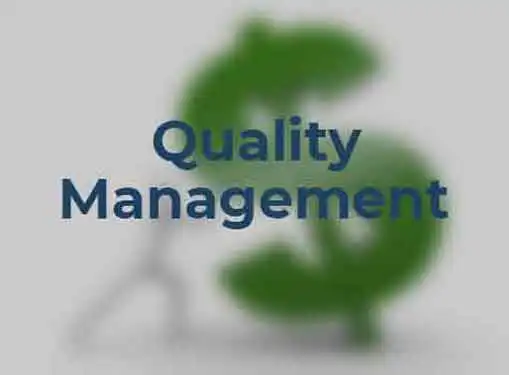Operating Your Startup Business
Quality Management Systems
Quality improvement starts with a good quality management system. If you are serious about improving quality, reading our article on quality management systems is a great first step.
Business owners have always taken pride in their products.

In the old days, a tradesman could gauge the quality of his products with a glance.
Today, it's a little more complicated, but the need for quality assurance is just as important as it's always been. So how can today's small business owners maintain a high level of quality in their products?
Quality management systems (QMS) are policies, processes, and procedures that address the vital components of a business or organization. If you have been around business for any length of time, you should already be familiar with many aspects of QMS. For more than half a century, QMS has been a foundational concept, particularly for companies whose primary activity is product manufacturing.
The basic idea behind QMS is that it gives businesses the ability to measure operational performance and product quality, which in turn helps the company identify problem areas before it's too late. In many industries, customers place a high value on goods produced by a QMS-compliant company and rightly so since QMS is an objective gauge of the quality of the products they are purchasing.
Since a lot of quality management systems are designed for larger manufacturers, it can be a challenge to implement them in a small business context. However, it can be done. If you are a small business interested in leveraging the benefits of QMS in your company, here are some tips to help you get started.
Be committed to quality.
The goal of a quality management system is to provide the best possible products in the most effective and efficient manner. If your goal in implementing a QMS is simply to add a footnote to your marketing materials, then don't bother.
Your QMS will inevitably have an impact on your business and may require you to make some significant changes. To get through it, you - and your employees - will need to be completely committed to quality before you even begin the process.
Be yourself.
Some small businesses implement a particular QMS because it's the same one their competitors use. Big mistake!
There is no such thing as a one-size-fits-all QMS. Your company is unique, and so the QMS you implement needs to be flexible enough to be adapted to your businesses products, processes, and goals.
Be realistic.
Some quality management systems are so cumbersome that they are unrealistic for small businesses.
For example, the International Organization for Standardization's ISO 9000 series specifies standards for a QMS designed to address the design, development, and manufacturing of general products and services. However, many of the quality management systems available to bring companies into ISO 9000 compliance are designed for larger companies.
Small businesses who attempt to implement these "big company" systems ultimately find themselves with a QMS that is too large and too complicated to do them any good. ISO 9000 QMS's are available, though, and can be implemented in ways that make sense for companies of any size.
If you need help assessing which QMS is realistic for your business, you may want to consider employing the services of a QMS consultant.
Share this article
Additional Resources for Entrepreneurs





Conversation Board
We greatly appreciate any advice you can provide on this topic. Please contribute your insights on this topic so others can benefit.